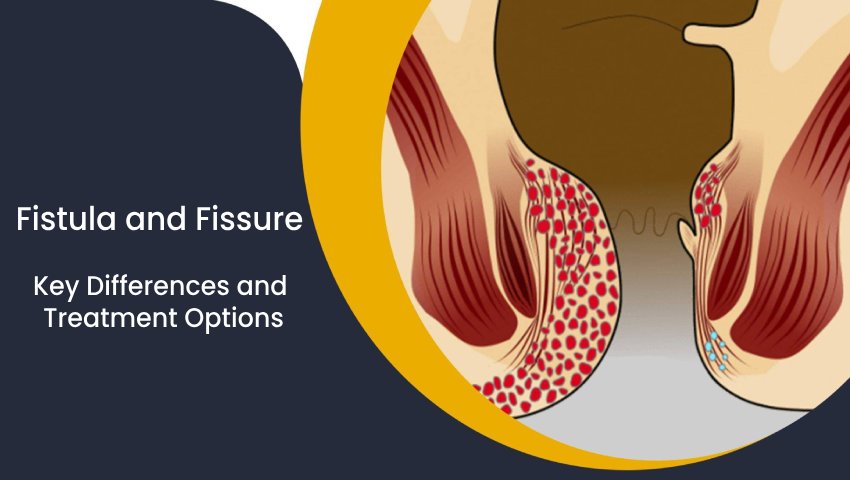
- 28/04/2025
- Kaizen Gastro Care
- 0 Comments
- Proctology
Fistula and Fissure: Key Differences and Treatment Options
Anorectal issues such as fistulas and fissures are common but often misunderstood. Many people delay seeking treatment due to shame or confusion about these conditions. However, early diagnosis and proper medical attention can prevent complications and ensure effective healing.
Dr. Samrat Jankar, one of Pune’s leading gastrointestinal and fistula specialists at Kaizen Gastro Care Clinic, provides valuable insights into these two distinct conditions — fistula and fissure — explaining their key differences, symptoms, causes, and available treatment options.
What is an Anal Fissure?
An anal fissure is a slight tear or crack in the lining of the anal canal. It typically causes sharp pain during or after bowel movements, and may also be accompanied by minor bleeding.
Common Symptoms of an Anal Fissure:
- Intense pain during and after passing stools
- Bright red blood on the stool or toilet paper
- A visible tear near the anus
- Itching or irritation in the anal region
- Muscle spasms in the anal sphincter
Causes of Anal Fissures:
- Passing large or hard stools
- Chronic constipation or diarrhea
- Straining during bowel movements
- Childbirth (in women)
- Anal trauma
- Inflammatory bowel disease
Anal fissures can be acute (short-term) or chronic (lasting more than 6 weeks). Acute fissures often heal with home care, but chronic fissures may require medical intervention.
What is an Anal Fistula?
An anal fistula is a small, abnormal tunnel that develops between the anal canal and the skin near the anus. It is often the result of a previous anal abscess that did not heal properly and became infected repeatedly.
Common Symptoms of an Anal Fistula:
- Persistent or recurrent anal abscesses
- Pain and swelling around the anus
- Discharge of pus or blood from an opening around the anus
- Irritation of the skin
- Fever and fatigue (in severe cases)
Causes of Anal Fistula:
- Chronic infection of an anal gland
- Crohn’s disease or other inflammatory bowel diseases
- Tuberculosis (in rare cases)
- Radiation therapy
- Trauma or surgery near the anal area
Fistulas do not heal on their own and usually require surgical treatment. If left untreated, they can cause ongoing infections and may lead to complications.
Diagnosis at Kaizen Gastro Care:
At Kaizen Gastro Care, Dr. Samrat Jankar conducts a detailed clinical examination, reviews patient history, and may recommend additional tests such as:
- Digital rectal examination
- Proctoscopy
- MRI Fistulogram (for fistula mapping)
- Endoanal ultrasound (in select cases)
These help in assessing the extent and severity of the condition and in deciding the best course of treatment.
Treatment Options for Anal Fissure:
For most patients with fissures, particularly acute ones, conventional treatment is the first line of approach. At Kaizen Gastro Care, these may include:
Dietary and Lifestyle Changes:
- High-fiber diet (vegetables, fruits, whole grains)
- Drinking adequate fluids
- Avoiding straining during bowel movements
- Sitz baths (warm water soak) for relief
Medications:
- Topical ointments (e.g., nitroglycerin, diltiazem) to relax the anal sphincter
- Stool softeners or mild laxatives
- Pain relievers for temporary relief
Advanced Treatment for Chronic Fissures:
If conservative methods fail, Dr. Jankar may advise Lateral Internal Sphincterotomy (LIS) – a minimally invasive procedure that involves cutting a small portion of the anal sphincter muscle to reduce spasm and allow the fissure to heal.
Treatment Options for Anal Fistula:
Unlike fissures, fistulas do not heal on their own and often require surgical intervention. The best fistula specialist in Pune, Dr. Samrat Jankar offers cutting-edge, minimally invasive techniques tailored to the patient’s fistula type.
- Fistulotomy: The most common and effective method for simple fistulas is where the tract is opened and allowed to cure from the inside out.
- Seton Placement: A surgical thread is placed in the fistula to keep it open and allow drainage. It is often used in complex or high fistulas.
- VAAFT (Video-Assisted Anal Fistula Treatment): A minimally invasive procedure performed by Dr. Samrat Jankar, which uses a fistuloscope to visualize and treat the tract internally. It reduces the risk of recurrence and preserves sphincter function.
- Fistula Plug or LIFT Procedure: These advanced sphincter-saving procedures are ideal for complex or high-risk fistulas.
- FiLaC (Fistula Laser Closure): A laser-based technique is used to close the fistula tract without cutting. It is sphincter-sparing and has excellent outcomes for selected cases.
Each method is chosen based on the location, complexity, and presence of secondary tracts or abscesses. Dr. Jankar emphasizes a patient-specific, evidence-based approach for optimal outcomes.
Conclusion:
While anal fissures and fistulas may seem similar to many patients, their underlying causes, symptoms, and treatment approaches differ significantly. Prompt diagnosis and proper treatment are essential to prevent complications such as chronic pain, infection, or recurrence.
If you or your loved one is experiencing symptoms like persistent anal pain, bleeding, or pus discharge, don’t ignore it. Consult Dr. Samrat Jankar at Kaizen Gastro Care Clinic, Pune, for expert diagnosis and personalized treatment.
Book your appointment today and take the first step towards healing.
